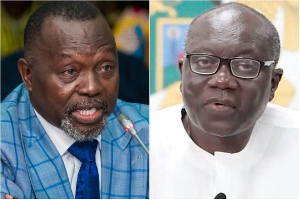Though some loose ends of the agreement/contract between the Ghana National Petroleum Corporation (GNPC) and Lushan-Eternit in the joint venture Saltpond Offshore Oil Production Company (SOPCL) may soon be tied, emerging details of the nation’s fiscal and legal regime for oil prospecting and production suggests that it may be easy for a camel to pass through the eye of a needle than for Ghana to strike oil.
The Independent, a private newspaper indicates that its findings in the wake of intense ongoing public debate generated by the unwholesome $2million Saltpond crude oil affair’ and its implications for the nation’s quest to strike oil in commercial quantities has set many tongues wagging.
Whilst some, particularly the opposition National Democratic Congress (NDC) sought to politicize the whole Saltpond affair, albeit unsuccessfully, “this paper has stumbled on information that suggests that until the nation changes the existing framework for oil prospecting and drilling, it may find it very difficult to attract investment for prospecting and drilling oil.”
“Transcontinental calls to Houston, USA to consult top players in the oil and gas industry revealed in many instances that until government takes bold and far reaching steps to attract investment for oil and gas exploration, Ghana might as well forget about striking large reserves of oil to help propel its development.”
“A source at the office of the International Activities and Marine Minerals of the United States Department of the Interior told us; last year alone, Nigeria drilled 200 wells and will increase the number this year and with such a pace, how do you expect to attract investment into your oil and gas sector. Last year, you were only able to drill just one well.”
Drilling one deep water well (200 metre depth) in Ghana costs $20 million whilst drilling one well on the continental sheif in Ghana costs between $5-$8 million dollars.
“GNPC has to be assisted to do a lot of promotional work to attract investors than it is doing now. Without promotion, no one will know what you are about.”
The Ghanaian government the report says must also move from just talking about changing the petroleum laws to attract investors in the oil and gas sector.
“Checks at GNPC corroborated the fact that two of GNPC’s partners – Devon and Encana - may be drilling in the Deep water Keta Basin. Devon is American-owned whereas Encana is Canadian owned.
Two other partners of GNPC, British owned Dana and American-owned Vanco who have concessions in the Western Tano and Cape Three Points respectively may not drill this year.
Houston sources told the paper that at a workshop in November 2001 in Houston, following the change in government, world-renowned Petroleum Consultant, Alfred J. Bolous, President of Bolous International, a company that specializes in Petroleum Consulting, Negotiations and Agreements, made it clear to the Ghanaian delegation that until Ghana changes the legal and fiscal regime of its petroleum sector, it may not attract investment.
In his paper, Bolous points out that whereas in Equatorial Guinea (the latest oil destination in Africa), for the years 1996, 1997 and 1998, the government had a take of 36, 56 and 62 per cent take respectively on petroleum contracts, the foreign investment oil contractors had 64, 44 and 38 per cent respectively.
On Ghana in 1996, the contractor take was 30 per cent whilst government had a take of 70 per cent. “No contractor will feel attracted to come and invest in such a situation considering the fact that the industry is capital intensive.
The source also drew attention to the fact that according to the world renowned Association of International Petroleum Negotiators (AIPN) Comparison of World Fiscal Systems (1998), Ghana has a two-star rating and is ranked 213 above Gabon which has a one-star rating and ranks 291 as well as Angola which also has one-star rating and is ranked 302.
“With this, why should Angola and Gabon be doing well in oil production than Ghana?”
“The Independent also found out that in the area of royalties and state participation in oil production agreements, whereas countries like Equatorial Guinea, Cote d’Ivoire, Guinea, Liberia, Sierra Leone and Kenya opt for royalties and non-state participation, Ghana has the unusual strategy of opting for royalties and state participation at the same time. This is putting off the investors. You either have royalties and give off state participation or have state participation and give up royalties. You can not have both state participation and royalties as you do in your country,” the paper says.
A summary of the petroleum legislation of incentives available in Ghana prepared by the AIPN reads thus: “Under petroleum law 84, GNPC is empowered to make contracts with oil companies on a production sharing basis. GNPC participates with 10 per cent carried through development and may increase participation later.
Tax is 50 per cent, with an Additional Petroleum Tax assessed after return of capital and based on Rate of Return. The tax may be paid on behalf of the contractor by GNPC if production sharing is used. Cost recovery is 100 per cent, provided the agreement includes royalty and tax. If a Petroleum Sharing Contract (PSC) is used, cost recovery is limited to 50 per cent.
Under the model PSC of 1995, cost recovery is not limited, participation is negotiated; duration is 30 years, of which exploration is six. Production split is based on the Rate of Return (RoR). Tax is 50 per cent with no mention of additional tax.
GNPC sources however maintain that Ghana’s model petroleum agreement is one of the best. “We only need to change a few rather than negotiated to enable the investor know exactly how much he has to spend from the first day.”
GNPC sources also disclosed that the existing model petroleum agreement does not provide for deep water drilling as it was made to cover only drilling in the continental shelf.
A report on the review of the regulatory regime on petroleum exploration and production in Ghana commissioned by the Commonwealth Secretariat and undertaken by Economic and Legal Section in January 2003 has also made several recommendations on the need to change the existing regime.
General News of Tuesday, 8 April 2003
Source: The Independent












